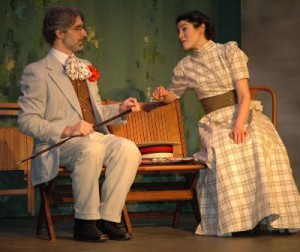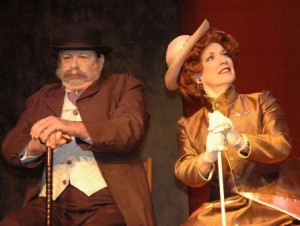“There are no secrets better kept than the secrets everybody guesses.”

Anthony Marsala and Julia Wise in a scene from MRS. WARREN’S PROFESSION. (Photo credit: Sara Stewart)
George Bernard Shaw was one of Britain’s most prolific playwrights—and one of its most beloved as well. He was quite controversial, too; Shaw used the stage as a vehicle to shed light on the many inequalities he found in the strict moral and social codes of the Victorian era. MRS. WARREN’S PROFESSION is no exception.
Written in 1893, the play’s subject matter caused a huge uproar; in fact, the first staging in America was shut down by police and everyone involved was arrested. You see, Mrs. Warren’s profession happens to be “the world’s oldest”—she’s a madam. Shaw stated his point was “to draw attention to the truth that prostitution is caused, not by female depravity and male licentiousness, but simply by underpaying, undervaluing and overworking women so shamefully that the poorest of them are forced to resort to prostitution to keep body and soul together.” The play was originally banned by Britain’s theatrical watchdog, the Lord Chamberlain. Finally, almost a decade after Shaw completed the script, MRS. WARREN’S PROFESSION had its first public performance on Sunday, January 5, 1902, at London’s New Lyric Club.
Kitty Warren (Bonnie Lay Grant) came from poverty. To support herself—and then her daughter Vivie (Julia Wise)— she worked the various low-paying jobs available to women of her class. Getting nowhere fast, she made the choice to run a string of brothels on the Continent. She was quite successful and Vivie was given the best of everything, including a first-class education at boarding schools. Eventually, Vivie attended Cambridge University, finishing 4th in her class—a major accomplishment for a young woman. The play details the first time the two women actually come face to face—and Vivie discovers what her mother does.
Oddly, Vivie seems to be the only one present who doesn’t know. Also on hand for this summer weekend in Surrey are Mr. Praed (Anthony Marsala), a long-time admirer of Kitty’s and Sir George Crofts (Christopher Applegate), her business partner. We also have Vivie’s admirer, Frank Gardner (Brian Weiser) and his father, the Reverend Samuel Gardner (Mike Mogar).
“People are always blaming their circumstances for what they are. I don’t believe in circumstances. The people who get on in this world are the people who get up and look for the circumstances they want, and if they can’t find them, make them.”
Director Barbara Mills has assembled an able cast and kept the action moving. It is clear she understands the heightened acting style needed to convey Shaw’s words. And, for the most part, the actors did as well.

Christopher Applegate, and Bonnie Lay Grant in MRS. WARREN’S PROFESSION at The Stagecrafters in Chestnut Hill (Philadelphia), PA. (Photo credit: Sara Stewart)
The real gems here were the two younger members of the ensemble. Wise and Weiser were wonderful to watch, bringing great nuance to their portrayals. They livened up every scene they were in—and, fortunately, that was most of the play. Marsala, Applegate and Mogar offered well-rounded characterizations as well, mining the comedy nicely. Marsala captured his character’s loopy artist persona perfectly, while Applegate gave Crofts the right notes of smarmy superiority. As the less than holy cleric, Mogar was suitably dithery and sanctimonious when needed.
As Kitty Warren, Grant was somewhat uneven, getting a little too shrill on a few occasions. It seemed to be the “When in doubt, shout” school of acting. Perhaps she was experiencing some throat issues that caused the shrillness… But I kept hoping for more subtlety in her performance.
As for the staging, I found the set interesting to look at as I waited for the performance to start, but somewhat confusing in the playing. The play requires four locations during the course of the action, so designer Scott Killinger split the stage, with a curved raised platform at stage right. At the start of the play this area served as the parlor of Vivie’s country cottage, with the garden area at stage left. What proved utterly distracting for me was that there was no definitive entry established for the cottage and actors just crossed into it willy nilly. It wasn’t clear if a portion of the downstage area was also supposed to be indoors or what. Very confusing, and it took me out of the moment on several occasions. The transitions to the subsequent locales went smoothly—and the delineation of the space was considerably clearer.
Nicely detailed period costumes were provided by Jen Adams, Janet Gilmore, Joan Blake and Susan Mooers. Kudos, ladies for a job well done; with another nod to Elise Brier for her work on the hair and make-up. Gilbert Todd has lit the space nicely and Bill Bansbach provides solid sound support.
Shaw is challenging to produce and perform. For the most part, Stagecrafters’ ensemble has done a credible job in capturing his intent. On the whole, this is a nice production, worth a visit to Chestnut Hill.
MRS. WARREN’S PROFESSION
by George Bernard Shaw
Directed by Barbara Mills
Feb.1 — 17, 2013
The Stagecrafters
8130 Germantown Ave.
Philadelphia, PA 19118
215-247-9913
www.thestagecrafters.org


